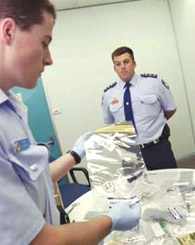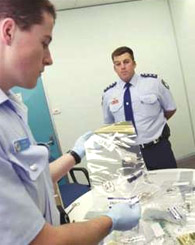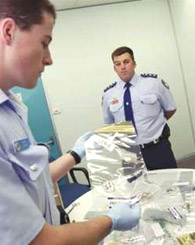There is no easy answer to the question posed in the introduction to this story.

More than 30 NSW Police officers raided Arq, a popular Sydney gay club on Sunday morning and had an order to shut Arq down for 24 hours under Section 104A of the state's Liquor Act - which allows a judge to order a venue to close for up to 72 hours if there is believed to be a threat to public health or safety. In a subsequent clean-up of the nightclub, police alleged they found 200 different drug items including vials of GHB and ecstasy tablets (shown above).
It's a helluva Catch-22, but then - it's a helluva fucked-up situation as well. Police claim that 11 people showed up at hospitals last Saturday night having overdosed on G - most of whom, they say, had been at Arq nightclub (the club owners say they were aware of only two overdoses on the night). The Ruby party in August saw five people drop after taking the drug and, on the same weekend, a 20-year-old gay man died of a GHB overdose.
But still the partying goes on � and when something bad happens, like a death or an overdose, the excuses come out: It Must Have Been A Bad Batch; He/She Was Inexperienced And Didn't Know What He/She Was Doing.
Drug educator Paul Dillon, who writes the Star's weekly column The Deal On Drugs, describes the "bad batch" excuse as "ridiculous and stupid."
"[The term] 'bad batch' implies that there are good batches, and the reality is that this is a risky drug, and it's a cop-out to say there was something wrong with [the batch]," he says.
The idea that it's only inexperienced users who overdose on G is another fallacy, Dillon argues.
"No matter how much experience you've had, things can still go wrong. If something hasn't gone wrong yet, it probably will eventually - and you can't say that for most other drugs," he says.
This is backed up by research, undertaken by the National Drug and Alcohol Research Council (where Dillon works) and ACON two years ago. That research showed that while only one percent of GHB users thought they could be susceptible to an overdose, 50 percent of users had overdosed and 25 percent of those who had overdosed had done so on more than one occasion. (Staff at St Vincent's hospital have been known to treat the same patient for GHB overdoses as many as six times.)
"It is very, very difficult to give harm minimisation messages for this drug, because the difference between having a good time and finding yourself unconscious in a hospital ward is very, very close," Dillon says.
But still people take it. Why?
Three reasons. One: it's cheap. If you buy in bulk you can get it for as little as $1 per millilitre. Two: anecdotal evidence suggests there's a lot of it around at the moment. Three: it works.
"It's a very cheap option, and the reality that you've got to accept is the drug gives users a great feeling of euphoria," Dillon says.
"There is a whole group of people now who are using this drug who, 12 months ago, were saying, 'I would never touch that drug.' What has happened is that they have started playing around with it, they haven't overdosed, they've had a very good experience on it and they've felt that obviously the people who had overdosed just didn't know what they were doing."

More than 30 NSW Police officers raided Arq, a popular Sydney gay club on Sunday morning and had an order to shut Arq down for 24 hours under Section 104A of the state's Liquor Act - which allows a judge to order a venue to close for up to 72 hours if there is believed to be a threat to public health or safety. In a subsequent clean-up of the nightclub, police alleged they found 200 different drug items including vials of GHB and ecstasy tablets (shown above).
"The worst part of what happened last weekend is that it will drive it underground again. If anyone believes that this will stop people using... it's not going to happen," he says.
Numerous sources for this story - including educators and party-scene people (including DJs) - said G has already had a devastating impact on gay scenes in America and England. Besides the human cost of deaths and overdoses, the drug has also been blamed for the closure of clubs such as Twilo in New York and Trade in London and increased police scrutiny of gay parties and club nights.
In a sense, that has now happened in Sydney as well. The weekend's police raid on Arq was not an "Operation Vikings" raid, but was instigated, says Surry Hills local area commander Lieutenant Tony Unicomb, "in the interests of public health and safety and to stop further persons from overdosing on prohibited drugs."
For this reason, the AIDS Council of New South Wales has welcomed the raid.
"We have had a number of differences of opinion with the police about their policing strategies around drugs, but we applaud any policing approach that supports health, and we think that that's what was done here," says Adrian Lovney, ACON president.
"If you've got people dropping like flies... then what the police did was a really good public health intervention. We support those kinds of interventions. It was proportional and successful."
With business set to resume as normal at Arq, community attention will turn increasingly to Sleaze Ball, to be held a fortnight from now. Could G ruin the big night for some of us - or even all of us?
Some think the potential is there. In a moving letter to the editor of Sydney Star Observer several weeks ago, written after attending the funeral of the young gay man who died of the overdose, Damon Hartley suggested community members refrain from using the drug until after Sleaze Ball.
"Saying no to drugs doesn't work, but we as a community have a responsibility to ensure that our venues are not destroyed by this drug," Hartley says.
New Mardi Gras co-chair Michael Woodhouse says gay community dance parties "have a really strong record of harm reduction", but ultimately, "people make their own decisions."
Partygoers are used to messages around drug use, but in the lead-up to this Sleaze Ball, those messages are likely to be a little stronger and more up-front than usual.

More than 30 NSW Police officers raided Arq, a popular Sydney gay club on Sunday morning and had an order to shut Arq down for 24 hours under Section 104A of the state's Liquor Act - which allows a judge to order a venue to close for up to 72 hours if there is believed to be a threat to public health or safety. In a subsequent clean-up of the nightclub, police alleged they found 200 different drug items including vials of GHB and ecstasy tablets (shown above).
"Our experience is that G is dangerous, and we need to provide people with those facts. The overdose rates are much higher than many people think, and our view is that it's very difficult to use G safely," he says. "Therefore, our advice to people is that they should avoid using it."
Woodhouse says that while partygoers should listen to such "credible health information," it is not the role of New Mardi Gras "to tell people what they should and should not do."
"If credible health organisations are providing clear advice around G, that's pretty persuasive," he says. "Nevertheless, our responsibility is to make our parties as safe as possible, based on the decisions people will make." To this end, he says, the parties include full on-site medical teams, drug rovers, information stalls, bag searches and the presence of police.
"We'll continue talking to police over the next few weeks about this, but I would expect that the police will continue to have a rational approach to policing at our parties, and will continue to respect that we're an organisation that's committed to harm reduction," Woodhouse says.
But a cornerstone of those harm reduction strategies, Dillon says, is community support.
"We've been very, very fortunate over the last few years, because the community has ganged together and we've made good choices," he says. "This is the first of the new Sleaze Balls, and if we want it to survive there has to be community spirit there, and you've got to think, how can we maintain that if we put ourselves at jeopardy by doing reckless things?
"When it really counts, people in our community have done sensible things, and we've just got to hope that this is what the community does here."
The article was originally published in the Sydney Star Observer and is republished with permission.
Your views: Is it the responsibility of the club, party venue and organisers to stop their patrons from using substances? Should the onus be on the venues and organisers to have a strict no-drugs-on-premises policy or to make their parties as safe as possible, based on the decisions people will make, by having full on-site medical teams, information stalls, etc? Click on the forum link below to post your comments.











 Printable Version
Printable Version










Reader's Comments
Be the first to leave a comment on this page!
Please log in to use this feature.